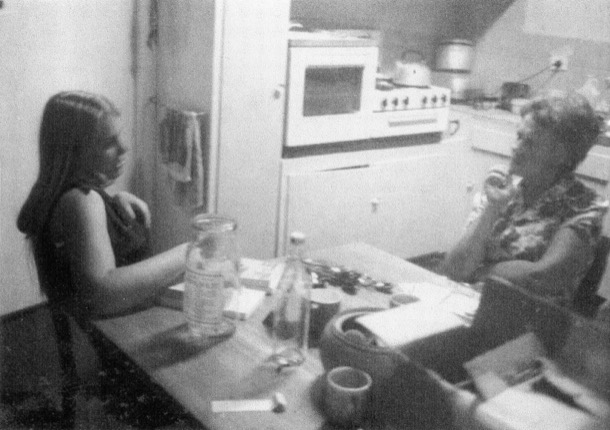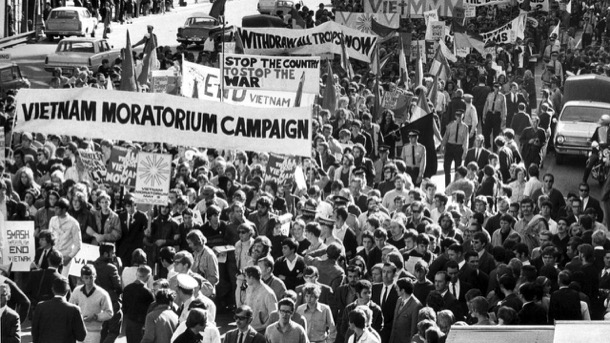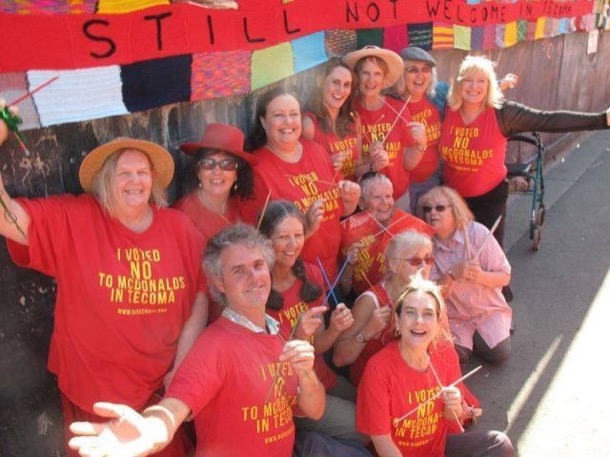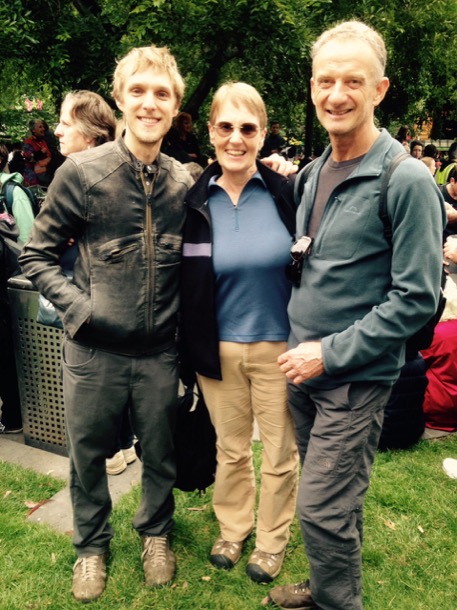How to Rescue the World
ALF AND ALFREDA
Marge and Alice in their family history tapes, discuss Alfreda’s political and philosophical bent. The setting is Croydon in the 1930s. Croydon is a country town and it is the height of The Great Depression. Alf is working long hours at the Croydon Timber Yard and the family sell milk and cream from their cow. Many of their neighbours are unemployed, and homeless men come to their door to ask for work or food. In Germany, Hitler’s Nazi party is beginning to show its true colours and Russia has been a republic for less than twenty years. Alfreda is consumed by the great ideas of Politics and Economics. She shares this with Frank Hibbert, the Croydon Primary School headmaster.
Alfreda’s friend, Frank Hibbert was a progressive educator who shared her political views. His influence on the young Marge and Alice was profound.
There are also signs of early environmentalism in Alfreda’s letters. On January 16th 1935, she and Alf are camping at Yellingbo, by the creek in what is now the protected area for the Helmeted Honeyeater. She writes to Alice:
Yesterday was a beautiful day and in the evening just after sunset - oh! I wish i could tell you or show you how beautiful the bush was - for half an hour. What God has given us is so beautiful, but don’t humans muck things up - an ugly fence, a cigarette butt, an old piece of lolly paper thrown down. an old pair of shoes - everything we touch seems ugly after that beauty that I saw last night- even our bodies haven’t the beauty and grace of the wild things….. I’ll see we don’t disfigure God’s beautiful bush when we leave this lovely spot.
And later, in 1946, Alf gives us a taste of his own strong sense of social justice. He is visiting Marge in Sydney and has just received the news that Alice and Jim have managed to buy the block of land in Box Hill South that became our family home. He writes:
Your news about your block of land caused quite a lot of excitement in the family circle. Our own few square feet of land is of great importance in our lives. At last we are the possessors of what really amounts to an inheritance - a small portion of God’s earth which we can call our own. It was ordained that each man should have his share of good earth; but man overruled God’s laws and made his own, thereby making it easy enough for a rich man to obtain all the land he wants to, but placing every obstruction in the path of the poor man to obtain that which is morally his own. It is only when people, like you two, scrape to save the wherewithal, that you get your share, or rather, a very small portion of it. But I must keep off my pet theme.
ALICE AND JIM
This was the value system that Alice, our mother, has passed on to us. We were never in any doubt about which side of any particular issue was the correct one.

Margaret and Alice at the Moore Street kitchen table
Both Alice and Jim, our father, were staunch Labour voters, and had a strong commitment to social justice.
The world’s first atomic bomb was detonated in Japan in 1945, followed by a nuclear arms race between the USA and the USSR. Bombs were tested, and people felt that there was a constant threat of war breaking out again. Alice and Jim and a like-minded couple from our street were involved in the call for unilateral nuclear disarmament. Another neighbour, Judah Watten, a writer and a communist, was also a member of this “leftist” protest group. This was the time of anti communist McCarthyism in America, and Jim and Alice’s actions were quite radical.
Alice became more confident and able to hold her own in conversations over these years. There were many discussions around our Moore Street kitchen table about the social or political issue of the moment.
Christian social justice became her main focus during her fifties and sixties.
She was active in a number of left wing church organisations. I remember in 1975, when I was living in the country, listening to her talk on the radio about third world poverty. Even in her later years, blind and housebound, she would listen avidly to the radio and talk about politics to anyone who would listen.
Of Jim, we have fewer memories. We remember marching with him in a teachers' protest on the issue of State Aid to private schools. We are now quite used to Governments providing money to private schools, but, when first mooted by the Menzies Government, it was greeted with outrage by many. One of Jim’s concerns during the march was that he would appear on the television news and be seen by his conservative, Catholic, Liberal voting mother.
Jim was a member of the Board of Management of our family’s church, St James, Wattle Park. He was outraged when he discovered the cost of the new church building. He resigned over the issue. In his view the money would have been better spent elsewhere. This is evidence of the strength of his principles, as his role in the church was important to him.
SUE
My memories of my early twenties and engagement in ‘protest’ is of the outrage of youth. ‘How dare they!’
During my last year at College and my first years of teaching, the VSTA, the union representing secondary teachers, was very active in a campaign to improve teaching conditions. I had had an early introduction to strike action by teachers when Margaret and I marched with Dad over state aid to non government schools so I was an eager participant in the ferment.
In outrage that the State Government would contemplate increasing class sizes and teaching allotments, a couple of friends and I formed a VSTA branch and began conducting meetings. I remember calling a strike meeting and organising a boycott of classes that we were convinced would change the world. It didn't! Fancy that! We were still fighting this battle during our first years of teaching.
A much more serious concern was the Vietnam War that the US had been involved in for years and, unbeknown to the public, so had Australia! Prime Minister Menzies had mislead the Parliament and the public, and had committed Special Forces to fight in Vietnam. His successor, Harold Holt, invoking the ANZUS Treaty, upped our level of support and, as the war dragged on with no victory in sight, National Service or conscription was introduced. My family and friends were all very much against the war and the deceptive and high handed action by successive Liberal Governments. Outrage and protest was a consuming passion.
It was sometimes a bit scary! In the early days before the huge moratoriums, the numbers protesting were considerable but not large, and the police seemed to be a threatening and sinister presence. I remember the July 4th 1967 protest outside the American Consulate in St Kilda Road. I went to this one with Mum and Margaret.
It was dark as we arrived and stood with the other protesters outside the closed front gates to the Consulate. There was no visible presence in the building, as we held our anti-war banners and chanted slogans. The most sinister aspect was watching the police buses pull up across the park and disgorge many, many policemen. I remember thinking, ‘Can this be Australia?’ A noisy and highly visible minority of the protesters were quite confrontational and aggressive and were consequently arrested. We stayed well clear of the action but it was hard to avoid the police horses. They are enormous up front and personal, and were used very effectively to nudge the crowd away from the gates. Overall it was a very sobering experience and one that has stayed with me. We live in a democracy with the right to protest peacefully. What must it be like protesting under less benign circumstances?
After these small beginnings the protest numbers swelled, culminating in the euphoria of the Moratorium Marches that brought cities across the world to a standstill, including Melbourne.

The ABC captures the spirit and the times better than I can. Have a look:
http://www.abc.net.au/archives/80days/stories/2012/01/19/3411534.htm
Even though I may have wished for many thousands to take to the streets again, as they did in the Moratoriums, it has not happened on such a scale, but here’s hoping!!
The demonstrations against the Vietnam War left a profound legacy. After such a powerful and successful protest movement, it seems the natural response to feelings of outrage: paint a banner and march! As Margaret says, ‘It is part of democracy’. Aren't we lucky!
Therefore, along with thousands of other concerned people, I have attempted to ban nuclear weapons, stop the war in Iraq, stop logging of old growth forests in Tasmania and East Gippsland and persuade our government to take action to reduce emissions.
The world has changed, but not always for the better. Today, as well as the kitchen table, the letter, the banner and the march, we have at our disposal the power of global and instant communication and social media. It is the era of Get Up and ’Clicktivism’.

Sue and Margaret protesting together at Tecoma
MARGARET
July 4th 1967. It is winter in Melbourne and it is raining. The puddles flash …blue…black…blue…black…
“Link arms!” call the young bearded marshalls running up and down the line of marchers. We are marching on the American Embassy, protesting atrocities in Vietnam, pressurising our government to change their “All the way with LBJ” policy. Police horses charge the crowd. One of my companions, my forty-three year old mother, loses her handbag.
Five years later a New Yorker I go out with a few times, assures me that there would have been fully armed Marines in the embassy, and that they wouldn’t have hesitated to shoot, had we successfully “stormed” the building.
This was my first real “demo”. I don’t remember why it was just my sister, my mother and I there. I was fifteen.
Over the ensuing fifty years, I have waved banners demanding many things: the end to the logging of old growth forests and the creation of National parks; that uranium be left in the ground; that there be land rights for our indigenous populations; smaller class sizes; a fairer allocation of education funds and more of them; that we not go to war and/or bring our troops home; that the public service not be decimated by cuts; that the separation of power between the judiciary, the legislature and the executive be maintained; that MacDonald’s stay out of our Hills community.
Most recently I marched with Michael and Chris to urge our planet to act on Climate Change:

Marching for climate justice... a family affair
The thread that links these causes, is the same thread that runs back to the 1930s around the Coates’ dinner table in Croydon. It involves words like environment, justice, democracy, fairness, equity, peace, kindness and conservation.
